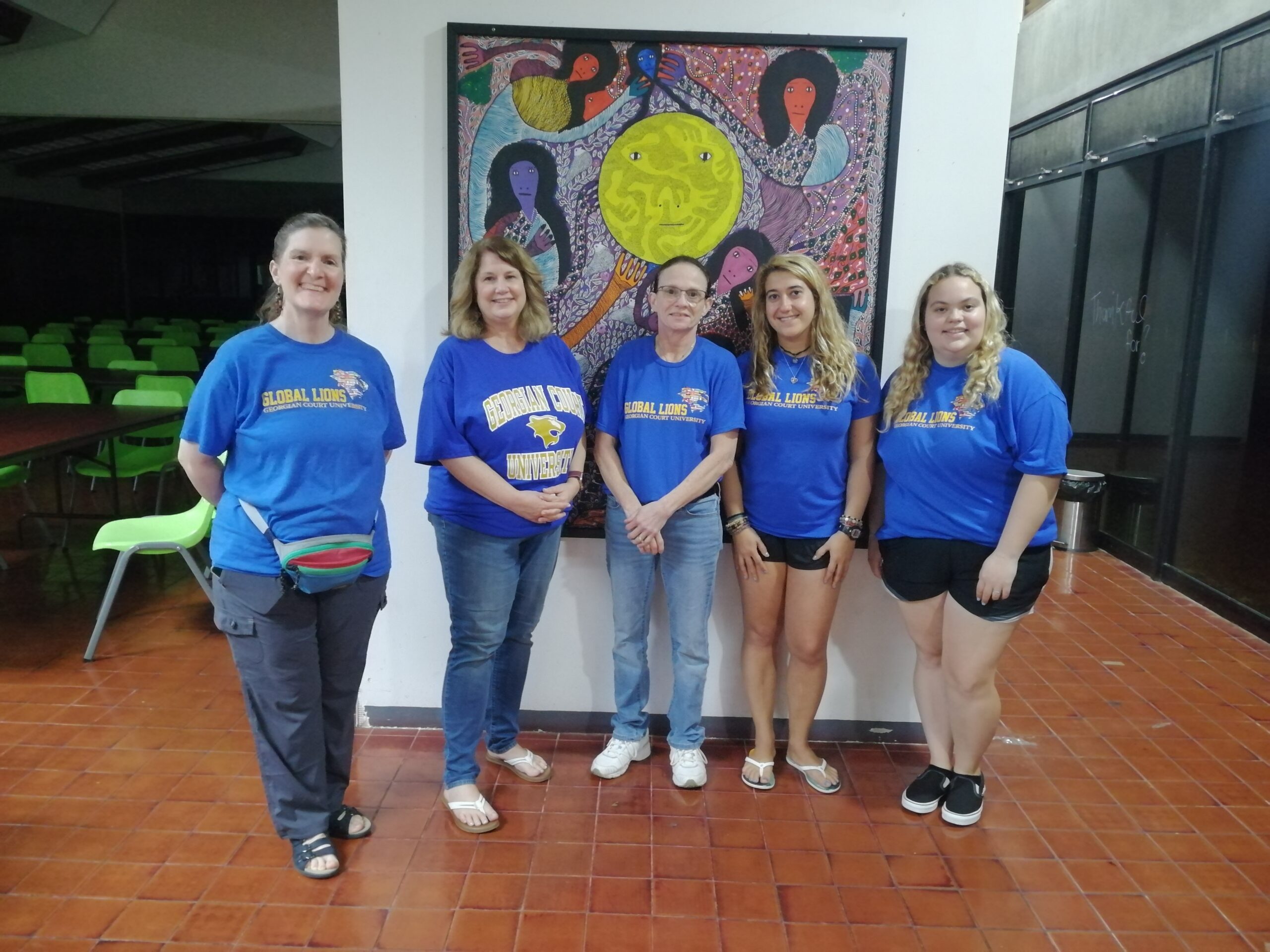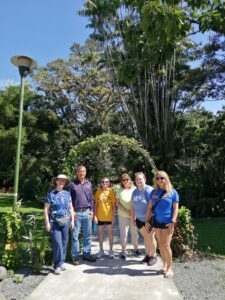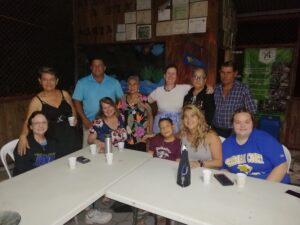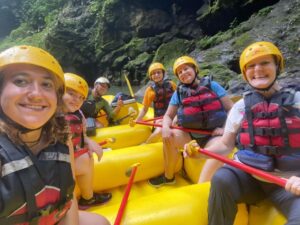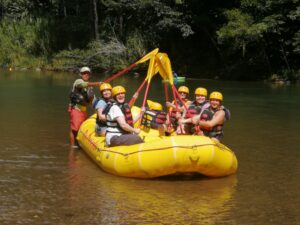By: Erica Cuccurullo
Costa Rica was an amazing trip. Being able to look at the city on the first night was an amazing introduction. It allowed us to see the city and all the amazing buildings that have so much history to Costa Rica. I enjoyed touring all the farms and seeing what each of our host families had to offer as it was truly an incredible experience. Each family in the community was so different and really opened my eyes to all the different things that Costa Rica has to offer whether it is coffee, dairy products, or even just different exotic plants. White water rafting was the most fun experience of the entire trip, and I enjoyed the thrill of getting to go down the exciting rapids. Not to mention having lunch on the side of the Pacuare River. We also spent a lot of time learning about Cacao and all the ways that people make chocolate. While visiting CATIE, we learned all about the programs that they offered there all while exploring the campus. Throughout this trip, we all learned so much about the environment and how people can be more sustainable with their farming. Overall, the trip to Costa Rica was a once in a lifetime experience that I’m happy I was able to be a part of
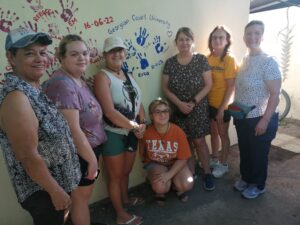
By: Vickie Wilde
Costa Rica is one of the world’s richest biodiversity hotspots, and it beams with wildlife and a wide variety of plant life. Costa Rica is also one of the best places in the world to learn about and experience sustainable living. I will never think about farming or food in the same way again. My perspective on ecotourism, sustainable agriculture, women’s empowerment, and business ownership has changed significantly due to my exploration of social and environmental justice in Costa Rica. My amazing experiences included living with a host family and working in and learning about sustainable agriculture. We participated in hands-on service learning, like planting coconut trees with the community, and our projects centered around the community and sustainable living.
Food security, sustainable enterprise growth, research, academia, and policymaking are all part of women’s responsibilities in the agricultural workforce in Costa Rica. They practice an inclusive green development strategy that encourages the programs to guarantee intergenerational justice. Participating in diverse groups in society and protecting their environmental region’s capacities provide ecosystem services essential to their well-being. Similarly, the significance of the indigenous people’s knowledge and the need to restore their land, assert their rights, pursue self-development, and defend their lands and natural resources are also essential to sustainable processes.
We stayed in CATIE, a university for tropical agricultural research for master and doctoral students. CATIE students work with Earth University students to improve agriculture and protect biodiversity in Costa Rica, Central America, and the Caribbean by combining science, education, and new ideas. CATIE is the first graduate school in Latin America for Agricultural Sciences. At CATIE, they undertake leadership in gender and social inclusion concerns with higher education and research, in addition to implementing positive actions to acknowledge spaces for access to resources, opportunities, and well-being for all individuals. They promote social inclusion and gender equity in a multidimensional manner, supporting the meaningful participation of women, indigenous peoples, and youth in the decision-making processes of the programs and initiatives promoted by CATIE headquarters and participating nations.
Nortico Cacao Farm took us on a tour during which we learned the history of Theobroma cacao, sometimes known as “Food of the Gods,” and how the flavor of chocolate as we know it today was developed via the process of experimenting with and refining the cacao bean over the years. Cacao is one of the most economically important crops in Costa Rica.
During the 18th and 19th centuries, cacao beans served as a currency in commercial transactions. The cocoa plants suffered severe damage due to Monilia, a fungal disease that first appeared around 1980. As a result of suffering crop losses ranging from 25 to 100 percent, many farmers decided they could no longer afford to continue growing chocolate. The Nortico Cacao Farm is an organization that works alongside CATIE and Earth University students studying the revitalization of cacao farming in Costa Rica. Nortico Cacao Farm hopes to use sustainable farming practices and persuade other farmers to do the same by giving their products, services, experience, and, not least, their hard work an added value.
Farming that continues for numerous years is known as sustainable farming. Food production is critical to preserve natural resources, ecosystems, and species for future generations. Soil and the organisms within it are nurtured to promote plant growth. There is a strong emphasis on maintaining and protecting natural habitats, and the farmers tend to cooperate with it rather than resist it.
Unfortunately, mass-produced cash crops such as bananas, cacao, coffee, and pineapple were all grown commercially in Costa Rica using many chemicals, pesticides, and fertilizers. Inevitably, this short-term thinking caught up with them and caused a crisis. The soil became depleted, workers were put at risk, fresh water was contaminated, and forests were cut down for money-making farming schemes. Damage was done to the environment, people were affected, and overall production plummeted. The Costa Rican government responded by instituting extensive agricultural reform, implementing environmentally responsible agricultural practices, and rediscovering the trade secrets passed down from previous generations.
Costa Ricans have a connection to nature that many of us have forgotten. We should all reconnect with our environment by digging our hands into the soil, tending to plants and watching them flourish, and eating fresh, local, organic, and healthful food. We should all live purer, cleaner lives and strive to make the earth a better place rather than contribute to its deterioration. They practice stainable farming in Costa Rica because they genuinely love our planet, its people, and their land. They can’t imagine doing it any other way, whether they have done it for generations or are part of the current rise in interest in organic farming. In Costa Rica, sustainability is not just a buzzword; it’s a way of life. People understand that organic growing and sustainability are not just nice to have; they are essential for our future on this planet.
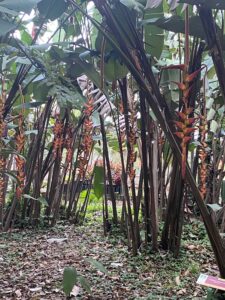
By: Gianna Macera
The trip to Costa Rica was truly unlike anything that I have ever experienced before. I have traveled to many different places and travel quite frequently although I have never met locals of the land that care and have such a passion as those I met during the trip to Costa. I went into this trip with little expectations considering that I have traveled to different parts of Central and Latin America where nothing has given me the sense of comfort that our homestay had given me. I was willing to do everything I could to help the community and was excited to learn new things and meet new people. I could have never predicted that by the end of our stay that I wouldn’t actually want to leave. This was the first time traveling with other students but it was nice to have my roommate be someone who I was able to effectively communicate with outside of our homestay family. I was able to connect with professors whom I would have most likely never met if I did not decide to attend this trip and I am forever grateful for all of their help and guidance throughout the trip. Our tour guide did an amazing job at making us all feel comfortable and welcomed as well as the locals we met along the way. We could have never have survived without our driver who went above and beyond to get us from place to place as safely as possible.
Learning about the Tico culture was truly admirable. I traveled throughout Costa Rica for 8 weeks without the class when I was traveling solo and the sense of comfort I had while with my class traveling through the mountains and farmland was unlike anything I felt compared to staying in the beach towns. It was admirable to see how hard working all of the local people we met with and the women gave me such inspiration with how much they truly care for their land. One of the most important things to know when being in Costa Rica is “Pura Vida” which basically means simple life or easy living and while staying with our homestay, it really showed how much “Pura Vida” was desired and attained. It is difficult to find exactly the right words about this trip other than humbling and inspirational. As someone who has a strong passion for sustainable agriculture, it was truly amazing to see how much love and care the locals put into their farms. Unlike the United States, in Costa Rica they do not grow for profit, they grow for sustainability and long term results. While at CATIE, we learned how the community depends on not only men but also women workers and farmers which was one of the first times in my life that I heard someone speak about men and women working equally and where women were actually praised in the working field. When we went to Blanco y Negro farm, I was touched emotionally and physically as I was able to see all of the hard work that 2 women had put into the farm in order to produce fresh food for not only themselves but to better the community as well.
Our homestay family welcomed us with open arms and I truly never felt like a guest or outsider as each family made me feel as though I was an actual relative. I would like to go back to Costa Rica for one reason only and that is to visit the homestay families once more and to help them in any way possible. Coming from a country where we turn even healthy food into some of the unhealthiest products, the locals I met gave me inspiration that hopefully one day, America can focus more on sustainable agriculture and focus more on the long term health of its citizens rather than factory produced foods solely for profits that are filled with such harsh chemicals and unnecessary ways of production.

